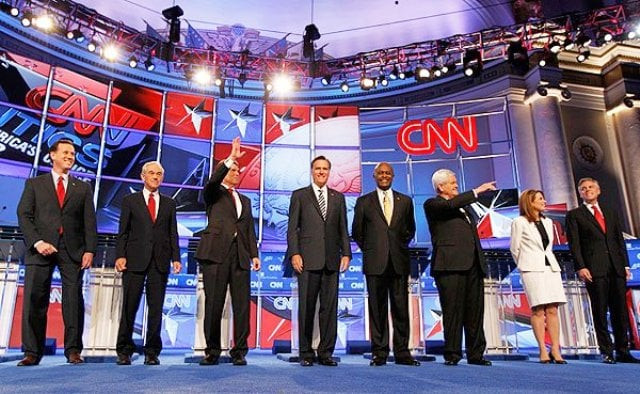Several weeks ago, US presidential candidates from the Republican party descended on Washington to participate in a televised debate on foreign policy. They wasted no time in unleashing a torrent of invective about Pakistan.
Michele Bachmann described it as “a nation that lies, that does everything that you could imagine wrong.” Jon Huntsman declared it “a nation-state that is a candidate for failure.” Rick Perry contended that “they’ve showed us time after time that they can’t be trusted.”
Some of the nastiest language came from the two frontrunners. “Help us, or get out of the way,” warned Newt Gingrich, “but don’t complain if we kill people you’re not willing to go after on your territory.” Mitt Romney proclaimed that “we need to bring Pakistan into the 21st century - or the 20th century, for that matter.”
In essence, the candidates depicted Pakistan as a lying, failing, barbaric state. Not exactly a glowing endorsement from those competing for the opportunity to occupy the White House.
Ironically, these fighting words come from a political party long regarded as more pro-Pakistan than its Democratic counterpart. Democratic presidents Jimmy Carter and Bill Clinton suspended aid to Pakistan, while Congressional Democrats have harangued Pakistan about human rights abuses and leveled nasty insults (Rep Howard Berman once likened Pakistan to a “rat hole”). By contrast, Republican Ronald Reagan lionised Ziaul Haq; George W Bush embraced Pervez Musharraf and lavished him with aid; and in the immediate post-9/11 era, Congressional Republicans implored America to open its markets to Pakistani exports.
Should Pakistanis be worried about these Republican presidential candidates? Not really. For one thing, they are far from assured of defeating Obama. None of them - including the favourites - enjoy a widespread following. The Republican establishment finds Gingrich too conservative, while the Tea Party-aligned base deems Romney not conservative enough. Yes, the Republican rank-and-file will vote for whoever eventually faces Obama, but expect numerous independent voters (and some disaffected Republicans) to opt for Obama - particularly if the economy is improving.
Additionally, the surging popularity of Ron Paul, a maverick who opposes aid to Israel and supports an immediate military withdrawal from Afghanistan, has many Republican officials terrified that he will bolt the party, run on a third-party ticket, siphon off votes from the Republican nominee, and thereby help engineer Obama’s re-election.
Paul’s foreign policy views are rigidly non-interventionist, and he wants America to have nothing to do with Pakistan - a position undoubtedly attractive to many Pakistanis. Additionally, with his legions of young supporters and anti-status quo views, Paul is the closest thing American politics has to an Imran Khan-like figure. Alas, Paul is unlikely to secure the Republican nomination, much less the presidency.
Republicans’ fiery rhetoric on Pakistan should be taken with copious grains of salt. In a campaign dominated by economic issues, not foreign affairs, the candidates’ Pakistan pitches should be recognized for what they are - hastily conceived, broad-brush, playing-to-the-gallery sound bites designed to fill time between substantive discussions on the economy. And if a Republican does become president, the shrill utterances would likely be replaced by Pakistan policies indistinguishable from Obama’s. There is general consensus across the US mainstream political spectrum about American interests in Pakistan.
There are, however, two causes for concern. One is how the Republicans’ angry talk reflects the extent of America’s anti-Pakistan sentiment. As I wrote earlier this year, US public support for Pakistan is at an all-time low, and a recent poll finds that two-thirds of Americans want to end all aid to Pakistan. Little wonder those bullying comments about Pakistan make for good applause lines - as demonstrated by the roar that coursed through the audience following Gingrich’s “help us, or get out of the way” warning.
The other troubling development is the influence the candidates’ hardline views are starting to exert on Obama. The New York Times reports that the president refused to apologise for the Salala raid in part because his aides feared Republican candidates would brand him as weak - implying that his re-election prospects could be undermined. Such crude political calculations give the Obama administration added incentive to keep drone strikes (launched from Afghan bases), occasional cross-border raids, and other hawkish tactics on the table.
Republicans may not dictate Pakistan policies from the White House anytime soon, yet they are managing to affect them quite successfully from the campaign trail.
The Republican threat
Republicans are managing to affect policies on Pakistan quite successfully from the campaign trail.



COMMENTS
Comments are moderated and generally will be posted if they are on-topic and not abusive.
For more information, please see our Comments FAQ